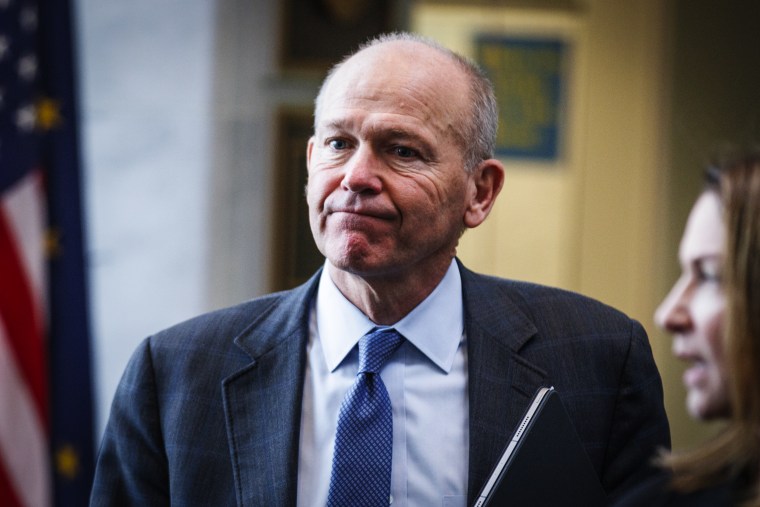Three senior Boeing executives including its CEO are stepping down, the company said Monday, as the company continues to deal with an ongoing scandal and federal investigation into the safety of its passenger jets.
CEO Dave Calhoun confirmed he was leaving the company by the end of the year in a statement. Stan Deal, the CEO and president of Boeing Commercial Airplanes, has retired effective immediately. Larry Kellner, chair of the company’s board of directors, will not stand for re-election at the next shareholders’ annual meeting. Boeing board member and former Qualcomm CEO Steve Mollenkopf will succeed Kellner.
The company has been mired in a slew of negative stories since a door panel blew out on a Boeing 737 Max plane flown by Alaska Airlines in January. The fallout from that fateful flight shows no sign of stopping: The FBI informed passengers last week that they may have been the victims of a crime that the bureau is still investigating.
Despite Boeing announcing a range of measures to improve safety and committing to working with federal investigators, some passengers have spoken of feeling nervous climbing on board its aircraft.
Boeing CEO Dave Calhoun in the Hart Senate Office Building on Capitol Hill on Jan. 25, 2024.Aaron Schwartz / NurPhoto via Getty Images file
In a letter to staff, posted on the Boeing website, Calhoun acknowledged that the Alaska Airlines incident had changed the company.
‘As you all know, the Alaska Airlines Flight 1282 accident was a watershed moment for Boeing,’ he wrote. ‘We must continue to respond to this accident with humility and complete transparency. We also must inculcate a total commitment to safety and quality at every level of our company.’
‘The eyes of the world are on us,’ he said, referring to ongoing efforts to reassure both the company’s airline customers and the flying public that its aircraft are safe.
In an interview with CNBC following Monday’s announcement, Calhoun acknowledged the ongoing challenges at Boeing.
‘We have this bad habit in our company,’ he said, adding production pressures continued to weigh on performance. ‘When you move it down the line, it sends a message to your own people that ‘Wow, I guess the movement of the airplane is more important than the first time quality of the product.’ And we have got to get that in way more balanced. Without a doubt.’
Calhoun said in the letter to employees that the company had over the last five years faced “some of the most significant challenges our company and industry have ever faced in our 108-year history.”
Calhoun was appointed CEO in 2020 in the wake of two other air disasters that some experts blamed on failures at Boeing. The crashes of Lion Air and Ethiopian Airlines in 2018 and 2019, which killed a total of 346 people, both involved the failure of a Boeing software system known as MCAS.
In an interview with the New York Times upon his appointment, Calhoun, who had served on the board of Boeing since 2009 and was appointed non-executive chairman in 2019, promised to change the internal culture at Boeing.
“It’s more than I imagined it would be, honestly,” Calhoun said at the time, describing the problems he was confronting at the plane manufacturer. “And it speaks to the weaknesses of our leadership.”
Yet in the same interview, he seemed to imply that American pilots would not have reacted to the MCAS system failures as the foreign-born ones did.
In the wake of the second crash in March 2019, the 737 Max was grounded worldwide and not re-approved for flight for nearly two years.
In 2021, Boeing agreed to pay a $2.5 billion penalty to settle criminal charges over accusations it concealed information about its 737 Max airplane, with Boeing admitting it had ‘deceived’ the FAA about the MCAS system’s reliability.
Calhoun said at the time that the settlement ‘appropriately acknowledges how we fell short of our values and expectations.’
In an interview last week, Michael Whitaker, administrator of the Federal Aviation Administration, told NBC News that Boeing had no choice but to develop a plan to improve its culture and practices to meet the agency’s safety standards.
Whitaker said Boeing’s priorities “have been on production and not on safety and quality.”
In the wake of the January Alaska Airlines incident, some Wall Street analysts said more drastic change was needed.
“How many times can ‘won’t happen again’ happen again?” Bank of America Corp. analyst Ronald Epstein wrote in a report in January.
“Both Boeing and [Boeing parts supplier] Spirit [AeroSystems] need a drastic cultural overhaul. This cultural change won’t come from FAA mandates, congressional hearings, internal memos, or one-hour all hands meetings. For culture to move from corporate jargon to being embodied in the habits and minds of both workforces, we see it as necessary for Boeing and Spirit to drastically rethink the ways they have operated.”






























